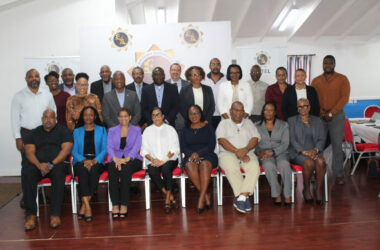
In commemoration of World Standards Day 2019 (October 14th) and World Quality Month, welcome to the first in a three-part series on the importance of the development of national quality systems and procedures to promote trade protect consumers and safeguard the environment. In this feature, we shed light on the network of interconnected and interdependent organizations and activities working together to enhance a country’s ability to trade globally and fuel the growth of local businesses.
Globalization has made it imperative for a paradigm shift in the way Caribbean countries do business. All Caribbean businesses are challenged to restructure their operations to meet international standards so that they can remain competitive.
A National Quality Infrastructure (NQI) is the first step towards helping Caribbean businesses improve their chances of competing internationally. The growth of Caribbean economies depends on it. As a Caribbean micro small and medium-sized enterprise (MSME) owner, it is time for you to tap into the benefits of an NQI so that you can get the support and guidance necessary to taste a piece of the success pie.
What is an NQI?
An NQI is national framework that guides the production of local goods and services based on agreed standards that follow international benchmarks. Simply put, it is an interconnected and interdependent network organisations, activities and people working together to ensure the quality, safety and environmental soundness of goods, services and processes in a country.Jamaica and Trinidad and Tobago have been leading the Caribbean in establishing strong NQIs. Antigua and Barbuda, Saint Lucia, Grenada, Guyana and Suriname have also taken up the mantle and have begun the process of developing their own National Quality Infrastructures with the guidance and assistance of the CARICOM Regional Organisation for Standards and Quality (CROSQ). It is time for other Caribbean nations to follow suit.
What are the 5 Core Components of an NQI?
The five core components of an NQI are:
Standardization: There is an established way of doing things nationally that enables local companies to compete globally.
Metrology: The science of measurement. Accurate measurements and measuring equipment are needed for honouring business contracts and protecting the health, safety, the environment and consumers.
Conformity Assessment (Testing, Inspection and Certification): Activities that determines whether a product, service, facility or management system, meets its documented standard.
Accreditation: Where an authoritative body validates that a certification body, testing laboratory or inspection body is independent, technically competent and proficient to carry out specific tasks.
Promotion: Raising awareness within a country through information and education campaigns on the importance of an NQI to promoting trade, protecting consumers and safeguarding the environment.
An NQI has a ripple effect on a country’s citizens even if they are not directly involved in trade and manufacturing. Here are a few benefits:
Access to more jobs as companies employ more people to help them achieve international standards
Products produced by local companies are safer and more sustainable
Consumers are better protected
Opportunities to travel increase as governments are able to negotiate better trade relationships
What are the Benefits of an NQI for Local Commerce?
A properly implemented NQI can spark a vibrant commercial industry that boosts the economy. Here’s how:
The costs of international trade are reduced because local standards no longer compete with international standards
There are less barriers to international trade
Local companies become more competitive in the global marketplace
Innovation increases which leads to the production of even better products and services
Recognition of the importance of quality within the local business community and ability to use such as a benchmark.
What are the Benefits of an NQI for Caribbean Countries?
Since an NQI helps both a country’s commerce and citizens, it stands to reason that these benefits extend to the country as a whole. Some additional benefits of an NQI to Caribbean countries include:
Ensuring that international standards and codes are being applied correctly across all industries
Creating consistency
Provides guidance for local producers which in turn makes them feel empowered
An increase in local commerce
Government officials being better able to represent the country in international fora and contribute to the creation of international rules
How Can Caribbean Countries Create a Strong NQI?
Follow the leaders. Jamaica and Trinidad and Tobago have been transparent in their NQI development process. These countries understood that a National Quality Plan/Policy was necessary for the effective implementation of an NQI.
It is for this reason that the CARICOM Regional Organisation for Standards and Quality (CROSQ) has received financing from the Caribbean Development Bank (CDB) in an amount equivalent to US$ 752,850 towards the cost of Strengthening of Regional Quality Infrastructure Programme. The first component of this project entails the development of three national quality policies using the regional quality policy. The countries involved in the Quality Policy Development project include: Antigua and Barbuda, Suriname, and Grenada.
A strong National Quality Infrastructure, for example, is necessary for Antigua and Barbuda with its heavy reliance on Tourism. For the tourism industry to remain competitive in the marketplace, providers of goods and services to the sector have to meet some industry standards and certification. The project also involves the creation of a suite of awareness raising tools for the participating countries of Antigua and Barbuda, Grenada, Guyana, Saint Lucia and Suriname, which also serve as guidelines for other countries in CARICOM.
Creating an NQI isn’t a one shot strategy. It requires the coalescing of various stakeholders, planning, training, and awareness raising and buy-in from citizens, entrepreneurs. CROSQ is on a mission to help all Caribbean nations do what is necessary to establish strong NQIs.
Putting it All Together
An NQI is critical for the development of Caribbean countries. This scattering of countries are only small peas in the pod of a highly competitive global marketplace. MSMEs in Caribbean nations need support to ensure that their products and services meet international standards. An NQI provides a national framework that helps all businesses meet international benchmarks. Take your business to the next level by following the guidelines of your country’s NQI.
Editor’s note: This article is made possible courtesy of the CARICOM Regional Organisation for Standards and Quality (CROSQ), the Caribbean Development Bank and the Saint Lucia Bureau of Standards.














